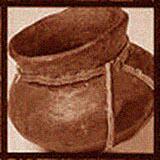 |
JARS OF CLAY |
Sometimes valuable artifacts are found in very mundane containers. One of the greatest archaeological finds of our times was that of the Dead Sea Scrolls. These scrolls, written about two thousand years ago, contain much historical information of that period. More importantly, however, they contain fragments of all the books of the Old Testament--except the Book of Esther. The text differs at points in word usage but not in teaching with the Masoretic Text which is the basis of Old Testament translations used today. A total of 382 manuscripts of the Dead Sea Scrolls have been found in caves in an area known as Qumran. This area is close to the northwestern corner of the Dead Sea. This great discovery was made in 1947 by a young Bedouin who was caring for some sheep or goats in that area. He happened to be throwing rocks into some caves around there when he heard the sound of smashing pottery. Upon investigation, the shepherd found some very old scroll fragments kept inside clay pots. Thus was made one of the greatest archaeological discoveries of the 20th century.
Had empty pots been the only discovery in the Qumran caves, very little stir would have been made in the scientific community. It was what these old pots contained that made them so extraordinarily valuable. The contents of the scrolls and not the clay pots themselves made this a truly great find. Still, without the protection that these pots gave, the scrolls would surely have been reduced to dust over the long eons of time spent in the caves. The clay pot kept their valuable contents from total decay over the hundreds of years of waiting.
The apostle Paul wanted to help his Christian family at Corinth to understand the real significance of the Christian life. Being a Christian is not simply a matter of do's and don't's--of ethical decisions or moral choices. Ethics is very much a part of Christian living as is morality, but these things alone do not entail the whole of Christianity. Paul wanted the Corinthians to see that being a Christian was more like being a container than being contents. The Christian is valuable not because of some intrinsic worth but rather because of what he contains and shares with the world.
For God, who said, "Let light shine out of darkness," made his light shine in our hearts to give us the light of the knowledge of the glory of God in the face of Christ. But we have this treasure in jars of clay to show that this all-surpassing power is from God and not from us. We are hard pressed on every side, but not crushed; perplexed, but not in despair; persecuted, but not abandoned; struck down, but not destroyed. We always carry around in our body the death of Jesus, so that the life of Jesus may also be revealed in our body. For we who are alive are always being given over to death for Jesus' sake, so that his life may be revealed in our mortal body. So then, death is at work in us, but life is at work in you. (II Corinthians 4:6-12)
The essence of Christian living is Christ living in the heart and life of the believer. Without Christ participating actively in the life of the Christian, there can be no Christianity. People claiming to be Christians yet living lives void of Christ are only deceiving themselves. It doesn't take long for people to see that a Christ-less 'Christian' is only a phony. Such a person would abandon ship at the slightest hint of trouble much less encounter real persecution. For Christ to live in one's life, self must die. As Paul explained it to the Galatian Christians in these words: "I have been crucified with Christ and I no longer live, but Christ lives in me. the life I live in the body, I live by faith in the Son of God, who loved me and gave himself for me." (Galatians 2:20)
Paul's life was truly an example to us of one dying to self and allowing Christ to live instead. His was no hocus-pocus, goose bump religion better felt than told. He lived a life that centered on accomplishing the purpose and will of Christ. And Paul's greatness as a servant of Christ came not through his great learning or his personal ability to preach or debate. It came through his humble submission to the Lord Jesus Christ and through his total reliance upon God as his strength and stay. Because Christ truly lived in him, Paul was very willing to put his life on the line for Jesus. In so doing he experience much persecution. Yet with Christ living within, Paul may have been knocked down at times, but he was never knocked out.
David Hubbard — 1/16/98